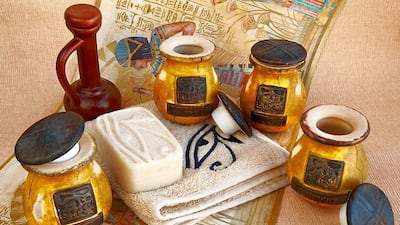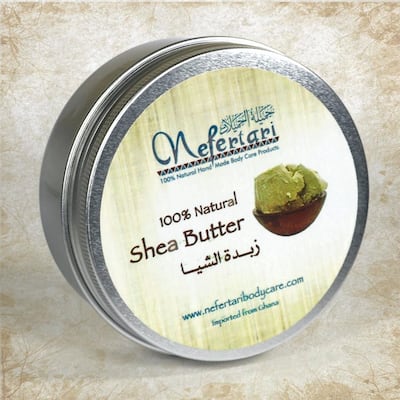Much like organic foods and farmers’ markets, natural skincare is a movement that found its roots in the anti-establishment sentiments that put an end to the use of DDT in agriculture. But what started as an alternative method of self-care, practised by a few bohemian beauty seekers, has now become a quintessential cornerstone of the global cosmetics industry.
It’s not just the West that’s going natural, either; organic skincare has found a strong foothold in Egypt – home to the world’s foremost beauty buff, Cleopatra. Millions from the Arab world’s most populous country, spanning a range of ages, genders and socio-economic backgrounds, are now seeking out the benefits of natural skin, hair and make-up products.
Bringing natural skincare back to Egypt
Nefertari, Egypt’s oldest and most prolific natural beauty operation, started in Dr Mona Erian’s kitchen 25 years ago. The brand’s founder and chief executive began her foray into organic beauty in 1996, with an olive oil soap made to alleviate a severe allergic reaction her daughter had to a chemical shampoo that caused her to lose chunks of her hair.
"This was the first time I read about the chemicals in the common shampoos we were using, and I was astonished," Erian tells The National.
Erian, who worked for a pharmaceutical company at the time, became more perturbed as she conducted further research into the various chemicals that were also being used to manufacture soaps, creams and lotions.
"What frightened me the most was the number of carcinogenic ingredients, as well as products that can affect the kidneys, the liver, the lungs. They are really damaging in the long run," says Erian, who became disillusioned with chemical beauty products.
Nefertari now manufactures more than 500 products, from essential oils, soaps and creams to cotton towels and massage equipment, all made from 100 per cent natural ingredients.
Ancient skincare recipes that still exist today
While the small soap-making company has grown to become Egypt’s first large-scale natural skincare brand, the phenomenon predates the 1990s by a few millennia. In many ancient civilisations, people used natural ingredients such as olive oil, milk, honey, cedar oil, aloe vera, salts, clays, grapeseed oil and witch hazel to exfoliate, nourish, cleanse and moisturise their skin.
Nefertari, which relies heavily on ancient Egyptian imagery in its branding – after all, it is named after the first of the "Great Royal Wives" of Ramses II the Great – has also adopted a number of age-old skincare recipes in its range.
One such product is an anti-wrinkle face and neck cream made from sweet almond oil, shea butter and the essential oil of frankincense, all ingredients that would have been part of Cleopatra and, indeed Nefertari’s, vanity chests.
Beware following beauty trends blindly
Nefertari might have been the only player on the scene when it first started out, but today, there are dozens of competitors producing similar products, which is an attestation to how many Egyptians are interested in organic beauty.
"It's a hot trend for sure, and it's currently witnessing its heyday in Egypt," says Dr Sara Qaldas, a Bahraini-Egyptian dermatologist and aesthetician at ZO Skin Centre by Zein Obagi MD (previously Obagi Clinic).
Qaldas is a proponent of organic skincare products and their benefits overall; however, she reveals that there are a few issues with the way people use them, which she blames on the shallow nature of trends.
“Natural skincare products are great, but like everything else with health and wellness, people need to do a lot of research before they just jump in,” she says.
Are chemicals always a bad idea?
Qaldas says she has dealt with many patients with skin conditions that were made worse by the continued misuse of natural skincare products. Often, the solution to more severe conditions can only be found in chemical-based products, she says.
She explains that natural products are great for maintaining one’s skin if it was OK to begin with, but for skin conditions that require more specialised treatment, natural products may do more harm than good.
"If I see a patient with severe cystic acne, which is a common-enough problem, I would not prescribe tea tree oil or witch hazel, which are common and [beneficial] over-the-counter natural treatments for [regular] acne. But for the more severe cases, chemicals such as isotretinoin or benzoyl peroxide are much more effective."
Organic skincare pitfalls
Qaldas singles out two popular natural products that people need to use with caution: shea butter and vitamin C serums. Both are sold as stand-alone items, as well as mixed into many other creams and lotions.
“Shea butter is great, particularly in winter when our skin needs more hydrating. While I recommend that people use it on their bodies to moisturise, I would be wary of using it on my face since it is often too thick, and the skin on the face is more sensitive and prone to irritation,” she explains. “Another popular one is vitamin C products, which are really tricky to get right.”
Such serums, she says, can cause pigmentation when not used with sunscreen, but they also don’t work without UV rays from the sun, which “activate” the serum.
“Most brands will tell their clients to use vitamin C serums at night, so they don’t cause pigmentation, but that renders them ineffective since they need the sun to be activated. This is vital information that clients need to research before they use these products,” says Qaldas.
Always seek expert advice
Ghada Alaa, 22, a make-up artist who suffered from severe cystic acne when she was younger, reiterates Qaldas’s views as she remembers trying a number of organic treatments for her acne but to no avail.
“After I tried all the natural products under the sun, I finally decided to visit a dermatologist. She prescribed a specific routine that included products with impossibly complicated and scientific names,” says Alaa, whose acne cleared up three months later.
Trends are made all the more potent through rampant social media use, which has resulted in fads being introduced to billions around the world almost simultaneously. While this globalised connection has its benefits, the experts are still in agreement: when it comes to our bodies and what we’re putting in or on them, it is best to consult a doctor first.
It’s why Nefertari’s Erian always urges her clientele to first seek expert counsel to better understand any unique conditions they might be suffering.
“I sometimes get clients with hair loss issues. Before I recommend any of my natural products, I ask them to seek medical advice first. Because perhaps it’s anaemia or a reaction to something the client is eating; we never know.”



